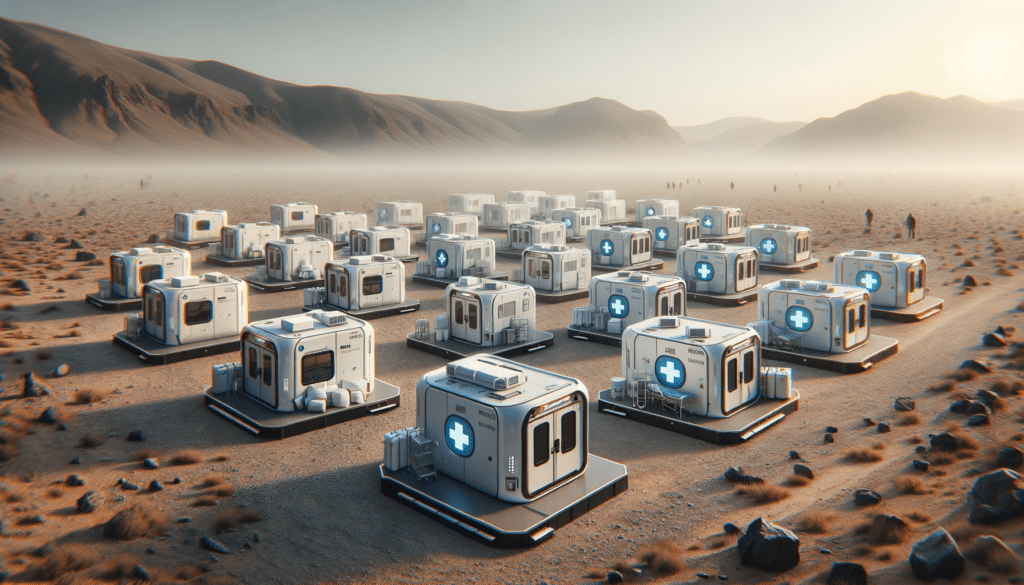Introduction to Mobile Healthcare Cabins
In an era where accessibility and efficiency are paramount, mobile healthcare cabins have emerged as a pivotal solution in delivering medical services to remote and underserved areas. These adaptable units are designed to provide essential healthcare services in regions where traditional facilities are either unavailable or overwhelmed. The significance of mobile healthcare cabins lies in their ability to bring medical care directly to the people, thereby bridging the gap in healthcare accessibility. This article delves into the various configurations and applications of these modular units, highlighting their role in health screenings, emergency response, and resource coordination.
Understanding Mobile Healthcare Cabins
Mobile healthcare cabins are versatile units designed to deliver medical services in a variety of settings. They are often deployed in rural and remote areas where permanent healthcare facilities are scarce. These cabins are typically equipped with essential medical equipment and supplies, allowing healthcare professionals to perform a range of services, from basic health screenings to more complex medical evaluations.
One of the key features of mobile healthcare cabins is their modular design, which allows them to be customized according to specific needs. This flexibility ensures that the cabins can be tailored to provide specialized services, such as dental care, ophthalmology, or maternal health, depending on the requirements of the community they serve.
Moreover, mobile healthcare cabins are an integral part of emergency response strategies. In the aftermath of natural disasters or during public health crises, these units can be rapidly deployed to provide immediate medical support. Their mobility and adaptability make them an invaluable resource in situations where time and accessibility are critical factors.
The Role of Modular Medical Units
Modular medical units are a subset of mobile healthcare cabins, designed with a focus on scalability and adaptability. These units are constructed using prefabricated modules that can be assembled and disassembled with ease, allowing for quick deployment and relocation. The modular nature of these units means they can be expanded or reduced in size to accommodate varying patient volumes and medical needs.
In addition to their flexibility, modular medical units are equipped with advanced medical technology, enabling healthcare providers to deliver high-quality care in non-traditional settings. These units are particularly useful in addressing temporary healthcare demands, such as during mass gatherings, festivals, or sporting events, where there is a sudden influx of people requiring medical attention.
Furthermore, modular medical units can serve as a testing ground for innovative healthcare solutions. By deploying these units in different environments, healthcare providers can experiment with new technologies and treatment protocols, gathering valuable data to inform future healthcare strategies.
Temporary Health Screening Pods: A Closer Look
Temporary health screening pods are compact, self-contained units designed to facilitate rapid health assessments. These pods are often used in situations where there is a need for quick and efficient health screening, such as during disease outbreaks or at entry points like airports and border crossings.
The design of health screening pods prioritizes infection control and patient safety. They are equipped with features such as negative pressure ventilation and UV sterilization to minimize the risk of cross-contamination. These pods provide a controlled environment where healthcare workers can conduct screenings safely and effectively.
Health screening pods are also highly portable, making them ideal for use in a variety of locations. Their compact size allows them to be transported easily and set up quickly, ensuring that healthcare services can be delivered promptly wherever they are needed. This mobility is crucial in emergency situations, where time is of the essence.
Conclusion: The Future of Mobile Healthcare Solutions
Mobile healthcare cabins, modular medical units, and temporary health screening pods represent a significant advancement in the delivery of healthcare services. These innovative solutions are transforming the way healthcare is accessed and delivered, particularly in remote and underserved areas. By bringing medical care directly to the people, these units are helping to overcome barriers to healthcare access and improve health outcomes.
As the demand for flexible and efficient healthcare solutions continues to grow, the role of mobile healthcare cabins is likely to expand. Future developments may include the integration of telemedicine technologies, allowing for remote consultations and diagnostics, further enhancing the capabilities of these units.
In conclusion, mobile healthcare solutions are poised to play an increasingly important role in global health strategies, providing a lifeline to communities in need and ensuring that healthcare is accessible to all, regardless of location.


